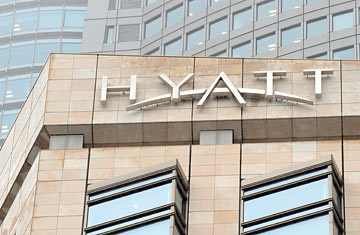
The Grand Hyatt Tokyo
Is Hyatt's upcoming IPO gutsy or foolhardy?
That's the question industry observers are asking as hotel powerhouse Hyatt Hotels prepares to jump into the public markets at a time when the lodging sector has spiraled to lows not seen since the Sept. 11 terrorist attacks.
"Hotels are highly sensitive to economic conditions, labor, cost of living and consumer confidence. So, when times are at the lowest like this, it's probably not the best time to go to the market and expect to get a huge payoff," says Mark Lunt, a principal in Ernst & Young's hospitality advisory practice. "It would appear that this is early in the cycle to have a hotel IPO."
"This would not be my choice for [an IPO] window," concurs Jim Butler, chairman of the global-hospitality group at Jeffer, Mangels, Butler & Marmaro LLP.
The sector should either be booming or be poised for a boom when filing an IPO, adds Lunt. "We've still got 12 to 18 months of negative financial growth and the market is probably not going to reward you any kind of premium."
Hyatt, which owns or operates 413 branded hotels encompassing 119,509 rooms in 45 countries, filed in August with the Securities and Exchange Commission to raise at least $1.15 billion dollars through an IPO, and will trade on the NYSE under the stock symbol H. The date and pricing of the offering have not yet been named. Hyatt's IPO will be the country's second largest this year, according to Dealogic.
The filing comes as the debilitating recession, rising unemployment, a sharp pullback in business travel and weak consumer confidence have taken a crippling toll on hotels. In the first seven months of 2009, hotel occupancy was down 10.3% while average daily room rates are off 8.8%, according to Smith Travel Research (STR). At the same time, lodging stocks lost 80% of their value on average over the past year, although many have rallied back a bit in the past couple of months.
Revenue per available room, or revpar, which is a key metric used to measure room revenue growth, plunged 18.2% between January and August — the sharpest decline recorded for this period since STR began tracking the industry in 1987, says Bobby Bowers, senior vice president of STR's operations.
Although revpar has been declining at a slower pace in recent months — slipping 20.4% in May, 18.7% in June and 15.7% in July — Bowers doesn't expect revpar to stop falling until 2011 at the earliest. Butler believes it could be 2013 before the industry significantly rebounds.
Download the new TIME iPhone app at app.time.com.
